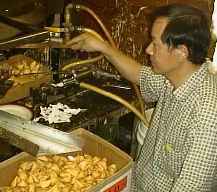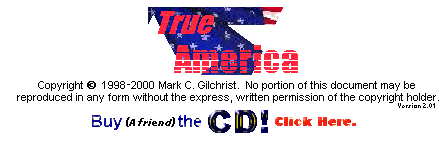The Good Luck Club

Yukming ("Larry") Lai cleans griddles on one

 Sunday, August 16, 1998, Philadelphia, Pennsylvania -
Take the few small steps into Yukming Lai's fortune cookie factory at Race and Seventh Streets, in Philadelphia's Chinatown and you have taken a giant leap around the world. You have arrived on the island of Hong Kong, into the factory district, through a maze of alleyways, into a dark building, in the basement, to the very rear of the building - where the really good treasures always are.
Sunday, August 16, 1998, Philadelphia, Pennsylvania -
Take the few small steps into Yukming Lai's fortune cookie factory at Race and Seventh Streets, in Philadelphia's Chinatown and you have taken a giant leap around the world. You have arrived on the island of Hong Kong, into the factory district, through a maze of alleyways, into a dark building, in the basement, to the very rear of the building - where the really good treasures always are.

of his fortune cookie making machines
in his factory in Philadelphia's Chinatown.
 The Chinese Cookie Factory is a classic mix of machinery, labor and noise - lots of noise as the three cookie machines, each the size of a hot tub, bake, assemble and fold nearly five thousand cookies per hour.
The Chinese Cookie Factory is a classic mix of machinery, labor and noise - lots of noise as the three cookie machines, each the size of a hot tub, bake, assemble and fold nearly five thousand cookies per hour.
 Yukming Lai, who has been in the United States for twenty-one years and has been a U.S. citizen for sixteen, goes by the English name of Larry. He has been making cookies here for a decade now and he sees no end to his good fortune.
Yukming Lai, who has been in the United States for twenty-one years and has been a U.S. citizen for sixteen, goes by the English name of Larry. He has been making cookies here for a decade now and he sees no end to his good fortune.
 First Lai mixes the batter - a simple recipe of sugar, flour, water and oil - and he mixes a lot of it, enough to make over 600 pounds of cookies in a ten-hour day. He pours the batter into five-gallon buckets next to each machine, where a hose draws it up into the splurter.
First Lai mixes the batter - a simple recipe of sugar, flour, water and oil - and he mixes a lot of it, enough to make over 600 pounds of cookies in a ten-hour day. He pours the batter into five-gallon buckets next to each machine, where a hose draws it up into the splurter.
 I guess there is an official name for this device, but it is probably in Chinese. I'll call it a splurter, because it splurts about .22 ounces of batter onto little griddles as they pass by. The griddles bring the batter through an oven set at 375 to 400 degrees.
I guess there is an official name for this device, but it is probably in Chinese. I'll call it a splurter, because it splurts about .22 ounces of batter onto little griddles as they pass by. The griddles bring the batter through an oven set at 375 to 400 degrees.
 Two minutes later, the baked, warm and soft cookie will be lifted off its griddle and placed onto the folder. The slip of paper containing your good fortune is placed onto the cookie and then the concoction is folded into that unusual shape unique to the fortune cookie.
Two minutes later, the baked, warm and soft cookie will be lifted off its griddle and placed onto the folder. The slip of paper containing your good fortune is placed onto the cookie and then the concoction is folded into that unusual shape unique to the fortune cookie.
 The cookie then is dropped into a chute which sends it to the hopper. From here the cookie is either wrapped in cellophane or is put into a plastic bag with 95 others.
The cookie then is dropped into a chute which sends it to the hopper. From here the cookie is either wrapped in cellophane or is put into a plastic bag with 95 others.

 "They don't taste good hot," says Lai. But I disagree. Of course, it's harder to get the paper out of the cookie when it's soft and there is no proof that eating the fortune improves your chances of it coming true.
"They don't taste good hot," says Lai. But I disagree. Of course, it's harder to get the paper out of the cookie when it's soft and there is no proof that eating the fortune improves your chances of it coming true.
 Lai has tried flavoring his cookies with orange and chocolate, but the plain cookie, wrapped in cellophane, remains his most popular product by far. He buys his fortune messages, usually positive, with "Daily Numbers" printed on the back of each one. Many themes have been placed in cookies, including; comedy, insults, erotica and (possibly a combination of these three) political. Lai has made cookies for the Clinton campaign with messages promoting his achievements (again, possibly a combination...)
Lai has tried flavoring his cookies with orange and chocolate, but the plain cookie, wrapped in cellophane, remains his most popular product by far. He buys his fortune messages, usually positive, with "Daily Numbers" printed on the back of each one. Many themes have been placed in cookies, including; comedy, insults, erotica and (possibly a combination of these three) political. Lai has made cookies for the Clinton campaign with messages promoting his achievements (again, possibly a combination...)
 At forty-five years old, Yukming Lai plans to keep making good fortunes for a good, long time, but his children, in their early twenties, don't plan to carry on the tradition. His daughter works with computers and his son is training to be a pharmacist.
At forty-five years old, Yukming Lai plans to keep making good fortunes for a good, long time, but his children, in their early twenties, don't plan to carry on the tradition. His daughter works with computers and his son is training to be a pharmacist.
 Sometimes his family will help in the factory, but usually Lai hires two or three employees to keep up with the baking, packaging and shipping. He sells mostly to local restaurants and a distributor. Does he sell many to locals in Chinatown? "No, mostly to tourists," he says.
Sometimes his family will help in the factory, but usually Lai hires two or three employees to keep up with the baking, packaging and shipping. He sells mostly to local restaurants and a distributor. Does he sell many to locals in Chinatown? "No, mostly to tourists," he says.
 Lai offers me a couple of bags of cookies before I leave and I try to politely refuse, but am unsuccessful, and as I walk down Race Street to my bike, I crack one open and read my lucky message. It says; "Hard words break no bones, fine words butter no parsnips," and I wonder "what the heck does that mean?"
Lai offers me a couple of bags of cookies before I leave and I try to politely refuse, but am unsuccessful, and as I walk down Race Street to my bike, I crack one open and read my lucky message. It says; "Hard words break no bones, fine words butter no parsnips," and I wonder "what the heck does that mean?"
